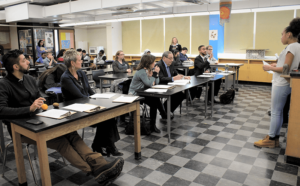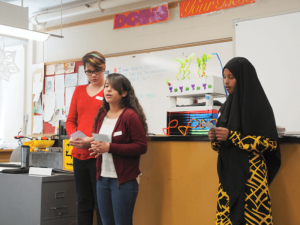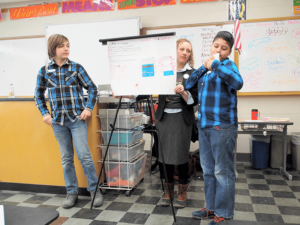“Shark Tank” referred to the entrepreneurs-venture-capitalists television show, not the occupants of the aquaponics systems Northeast Middle School (NEMS) students proposed to construct. Those use small fish, not sharks. In an all-day affair Jan. 13, teams presented ideas for various aspects of such systems and received feedback on their style as well as substance.
As explained in some of the presentations, in aquaponics fish produce waste, which plants use as nutrients, and the plants filter the water for the fish. It’s a soil-free system. According to www.theaquaponicsource.com, “In aquaponics you feed your fish inexpensive fish feed, food scraps, and food you grow yourself.” Humans harvest the herbs, vegetables, and greens grown to eat.
Minneapolis Mayor Betsy Hodges was one of the panelists for the event. “I’m excited to be here with you guys and you all, because I know how smart you are, and I’m interested to hear what your ideas are about solving one of the challenges that we face in Minneapolis,” said Hodges. She had written a letter to the students with the challenge to come up with the ideas.
Spark-Y, an educational nonprofit headquartered in South Minneapolis, hosted the event with NEMS. “We work in over a dozen schools in the Twin Cities metro area (including Edison High School) and with youth from first to twelfth grade,” said Spark-Y’s Education Facilitator, Rachel Mazac. “Frequently, we work through the lens of urban agriculture and have the students designing, building, and marketing sustainable systems.”
Mazac’s team worked with seventh graders and their science teachers at NEMS. The problem? Food deserts; parts of the country without fresh fruit, vegetables, and other healthful whole foods available within one mile in urban areas, due to a lack of grocery stores, farmers’ markets, and healthy food providers. The proposed solution? Aquaponics.
Each presenting group of middle-schoolers chose one aspect of aquaponics. Among the morning presentations: Using LED lights for grow lights. Making a video game to show kids how to make aquaponics systems – and the revenue from the game helping fund placing systems in classrooms. One group listed the benefits of specific recommended plants: rosemary, chocolate mint, and strawberries. Another recommended growing carrots, broccoli, spinach and sprouts.
Two groups had specific recommendations for growth mediums (where the plants are anchored), one choosing a commercially produced stone, one using river rock (each with their drawbacks, having to pre-wash the commercial product, and having to test river rock for limestone which could upset the chemical balance in the water). One group made an elaborate artistic model of a system.
Ian, who said he wanted to be a naturalist, and Miguel, a future firefighter, advocated for placing aquaponics systems out in the community, at least one per block, and discussed the appropriate sizing of the systems for their uses. They received compliments on having spoken without referring to notes, and for listening to previous presentations and referencing them in their talk.
Panelists gave suggestions such as “take a breath, slow down” and complimented students for “good eye contact” and “visual aids that were a constant reminder of what you were talking about.”
Minneapolis school board member Jenny Arneson told the LED-light group that they had convinced her of the personal benefit, that aquaponics can be done at home. “You made me think I could try it.”
Superintendent Ed Graff, who at the end of the morning thanked the teachers and students for listening to and supporting their classmates, participated with the panel and asking students questions. He complimented one group on waiting as the transition between groups settled down, before starting their presentation.
Minneapolis First Ward Council Member Kevin Reich beamed, listening intently throughout and asking his share of questions, giving feedback. He’s been a long-time advocate for the Edison High School Green Campus and Spark-Y.
At the lunch break, Bertrand Weber, Director of the Minneapolis Public Schools Culinary Center, showed off the middle school cafeteria. They have a salad bar featuring a roasted beet hummus that originated at Wise Acre Eatery and was introduced following taste-testing last year at the schools. A Southwest Pinto Dip will be sampled in schools Feb. 22-24. The district is gradually installing scratch-cooking kitchens in the schools for lunch service.
In the afternoon, seventh graders Brandon and Josh explained why they chose the Bluegill fish for their aquaponics system. “Bluegills are cheap to buy and I emailed the DNR whether you can catch your own Bluegill for that. You can but you have to have a permit,” said Josh. “But we will not choose to do that, because they could carry diseases and parasites and we wouldn’t want that to happen.”
When the students were done with their presentation, the panelists seemed impressed. “Do you guys have a date scheduled for your TED Talk yet?” said panelist Zach Robinson, Spark-Y’s Executive Director.
“I have to tell you that I too have learned I didn’t even know what a food desert was,” said Senator for District 51, Jim Carlson of Eagan. “So you’ve really taught me something that’s going to be very valuable as I work in the legislature.”
According to Mazac, the panelists gave points to each group based on a rubric, a list of expectations and point scale, they used during the presentations. Spark-Y would then tally the points and announce the winners in the following week. “The winners will get buttons and recognition in front of the class.” Then the students will continue with hands-on-learning as they build theiraquaponics systems at school.
“For this day in particular, our aim was for the students to experience a professional situation and feel important and heard by the community. We wanted them to give their input to people in their school and community and make it known to them that their ideas matter and they can do and be whatever they would like,” Mazac said. “For the panelists, the goal was for them to be immersed in some of the amazing work that the students are doing and connect it to larger impacts for the district and community.”
Before the day was over, one of the panelists, Phillipe Cunningham, a Senior Policy Aide for the City of Minneapolis surprised the students with an announcement. “Mayor Hodges gave us a big gift today, by declaring today, Northeast Middle School and Spark-Y’s Sustainability Day in the city of Minneapolis!” Amongst cheers Hodges said, “You all have earned your very own day in the city of Minneapolis, well done, congratulations.”
Below: The afternoon “Shark Tank” session panel (Photo by Liz Jensen) and two presentations from the morning (Photos by Margo Ashmore). The young ladies showed a detailed 3-D model, the young men earned compliments for speaking without those notes quickly pocketed before beginning.


